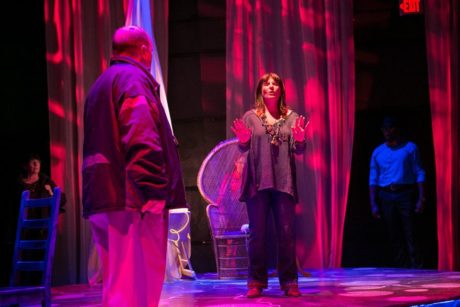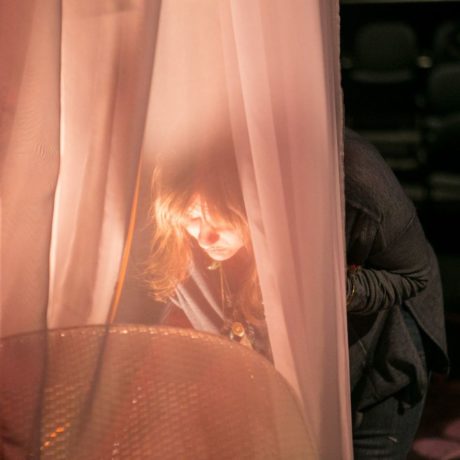At the center of this beautifully ambiguous and hauntingly honest play is a sick infant. The baby is peculiar, perhaps mythically so, in that it glows like the moon.
As we enter the theater, the baby’s mother is sitting knitting in a wicker chair beside a white bassinet, and she is singing a lullaby or maybe keening. We do not know yet whether this child will survive. We cannot foresee how much loss will be borne nor how much hope will be born as the subsequent story circles elliptically through the lives of random strangers. But we are drawn from the beginning into a drama that does not let us go even after it is done.

Randy Baker, Rorschach Theatre’s co-artistic director (with Jenny McConnell Frederick), has directed The Electric Baby with a poignant tenderness that is completely in keeping with Stefanie Zadravec’s lyrically surreal script. Set somewhat arbitrarily in Pittsburgh, The Electric Baby tells the stories of six characters whose lives intersect by accident—which ought not suggest the writer lacks in purposefulness, for the play proceeds with a wondrous strange inevitability.
The mother of the titular glowing infant is a Romanian immigrant named Natalia, who is a fount of funny folk cures. Jennifer J. Hopkins plays her with a mix of quick wit and mournfulness that from the beginning sets the touching tone of the play. Ambimbola, a Nigerian immigrant, is a cab driver who came to America with a dream of prosperity but found his dream’s doors slammed shut and now has high hopes of winning the lottery. J. Shawn Durham portrays him with a spiritedness that never completely leaves him even as the events of the play leave him steeped in sorrow.
Helen and Reed are a middle-age married couple whose lives are disrupted when Helen, impatiently awaiting their valet-parked car, happens to walk into the street, causing the cab driven by Ambimbola to crash into a light pole. It is the only violence in the play, yet it impacts everyone after. In Cam Magee’s superb performance as Helen we see a most remarkable interplay of feistiness and remorse. Well matched is William Aitken’s well-meaning and woeful Reed, whom we see in a scene with a 22-year-old escort as a hapless client.
Said escort, Rozie, also works part time in a restaurant as a server along with a young man named Dan, who’s got a huge crush on her. In their first scene, just after they’ve both been fired, they get into a taxi, bicker, banter with the driver, Ambimbola—then suddenly comes the crash. As Rozie, Sarah Taurchini is a delight—she totally nails the character’s spunk and moxie. Kiernan McGowan is equally enjoyable as her would-be boyfriend, Dan, and two other characters we meet as the story lines crisscross and unfold.
The storytelling swirling through the scenes is anchored in specific moments of emotional truth, to which each member of this excellent cast connects us. Now and then Natalia and Ambimbola also tell poetic fables that though somewhat cryptic lift the emotional and relational real world to a higher realm of meaning.
The scenes that follow from one another as if by chance are staged with the simplest of effects. Scenic Designer Betsy Zuck drapes a cone of white fabric over the white bassinet that connects above to a circular electrical grid while waves of electrical charge radiate on the floor. Lighting Designer Katie McCreary makes the flow of scenes seem cinematic and brightly lights both the baby and a moon. Sound Designer Thomas Sowers creates a shocking car crash as well as subtle ambiances of street, restaurant, and hospital. Costume Designer Frank Labovitz’s choices tell as much about the characters as the script.

You may well come away from The Electric Baby, as I did, with a sense that the playwright is present in this play in a way that is profoundly personal. That is indeed the case, as I learned from reading Zadravec’s powerful essay “In Sickness and in Health.”
Exactly what does The Electric Baby mean? I’m not sure, and I’m not sure it matters, because so much palpable emotional truth goes by in this interpretation that one becomes part of it just by letting it in. Followers of Rorschach Theatre’s showier, more usual approach to magical realism might be surprised, and very pleasantly so, for this is a play and a production purely from and for the heart.
Running Time: One hour 45 minutes, with no intermission.
The Electric Baby plays through May 15, 2016, at Rorschach Theatre performing at Atlas Performing Arts Center, The Paul Sprenger Theatre – 1333 H Street NE, in Washington, DC. For tickets, call the box office at (202) 399-7993, or purchase them online.
RATING:





